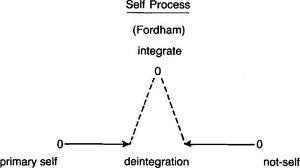 (from voicedialogue.com)
(from voicedialogue.com)
Understanding Relationships: Attraction and Bonding Patterns
We all conduct our relationships with other people using our personality. Our personality, however, is made up of various parts, which can be called sub-personalities or selves. So when we relate with others there are quite a few different selves involved in our relationships. This is why relationships are never simple or easy. It is rather like there are two families or two groups relating, and not just two people.

This is why sometimes we feel caring towards our partner and at other times we want to be cared for; it is why sometimes we admire a quality in our partner tremendously and at other times we see that same quality as a fault; and why sometimes something our partner does amuses us and at other times that same action irritates us.
 The selves which constitute our psyches include parental selves, child selves, rational selves, emotional selves and many more. We all have selves which we identify with and call ‘me’. These are our primary selves. We also have selves that we have repressed, which are our disowned selves. These disowned selves affect our actions, feelings and relationships as much as our primary selves do. In fact, they also strongly influence what kind of people we get into relationships with.
The selves which constitute our psyches include parental selves, child selves, rational selves, emotional selves and many more. We all have selves which we identify with and call ‘me’. These are our primary selves. We also have selves that we have repressed, which are our disowned selves. These disowned selves affect our actions, feelings and relationships as much as our primary selves do. In fact, they also strongly influence what kind of people we get into relationships with.
So it is important to gain an understanding of who your primary and disowned selves are if you wish to understand and enjoy your relationships fully and if you wish to be in relationship with the people you actually choose to be in relationship with.
How do you know who your primary and disowned selves are? The qualities that you admire excessively or overvalue in others, and those qualities that you really judge in others, give you a good indication of who your disowned selves are. So if you really admire someone who is an artist and you think that they are better than you because of their artistic ability, then you have probably disowned your own artistic self and you might have as a primary self a very logical, practical self. And if you really can’t stand someone who is blatantly selfish and you judge them for being selfish, then you have probably disowned your selfishness and have as a primary self a giving self.
What you have disowned and what is primary in you, also gives you a good indication of what kinds of people you will be attracted to and enter into relationship with.
The two main scenarios are:
1. You will like people who have similar primary selves to you, and you will dislike people who’s primary selves are your disowned selves. You will usually choose as friends those people who’s primary selves you like.
2. But you will be attracted to (and at other times repelled by) people who carry your disowned selves, either the positive ones or negative ones. Usually we will enter into quite intense relationships with people who carry our disowned selves.
We can learn to separate from our primary selves and step back from our bondings with others. This involves becoming aware of our primary selves as only a part of us and not as all of who we are. And it means developing an ego that can be aware of the totality of our being.
More can be found at http://delos-inc.com/articles/Embracing_All_Our_Selves.htm